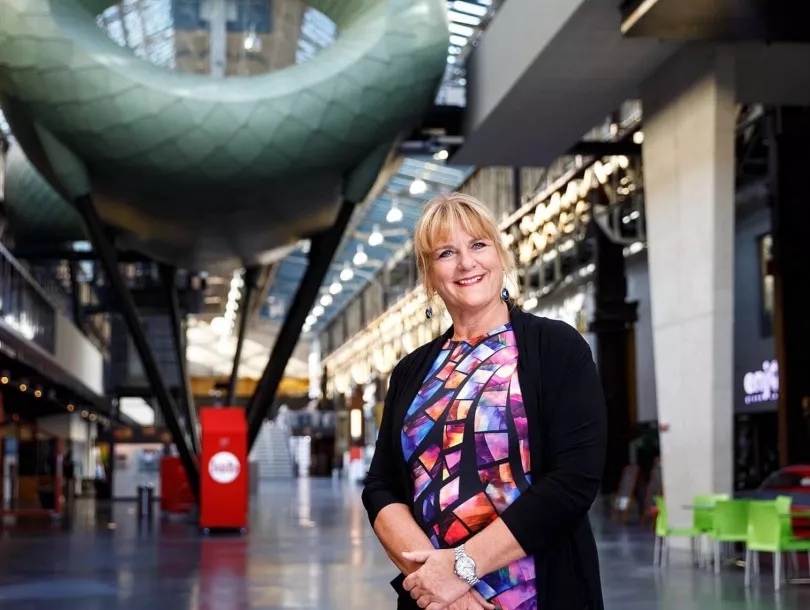Internationalisation at Home: what is your role as a supervisor?

Managers and supervisors of enthusiastic lecturers who want to work on Internationalisation at Home (IaH) should support these lecturers fully. So how can you do this and what do they need from you? 'Enthusiasm is great, but you need to add structure to their passion.'
Jos Beelen, professor of Global Learning at The Hague University of Applied Sciences emphasises: The goal of IaH is to introduce new perspectives and raise awareness that elsewhere in the world, people do things differently to us. You don't become a global citizen on your own, it is a collaborative process.
Margo Koopman, director of the School of Education, Sport and Welfare at ROC Twente, agrees. Travel matures you: I learned to reserve judgement, to listen to people who think and act differently and to work together with them. She emphasises that IaH is valuable to all students. 'You introduce them to cultural diversity regardless of their background or studies. Intercultural skills are an essential part of training students to become critical thinkers and doers who can keep their heads in a rapidly changing society.' According to Beelen, you often get lecturers for whom internationalisation is a passion. 'As a supervisor, it's your job to add structure to this passion by ensuring that internationalisation becomes a fully incorporated part of the curriculum.’ So how do you do this and what do people need from you in your capacity as supervisor? Read on to see how Jos Beelen and Margo Koopman answer these questions.
What role must managers and supervisors play in order to incorporate Internationalisation at Home into the curriculum?
Beelen: 'IaH should be done from the bottom up', says Beelen. 'It is unrealistic to adopt a top-down approach and assume that if we put it into policy, then it will just appear by magic.
Ultimately, internationalisation is only feasible if you have a solid strategy.' Koopman: 'The most important thing is commitment', says Koopman, 'as internationalisation is not a mandatory part of the curriculum. Whenever any colleagues show enthusiasm for this subject, you must take this interest seriously. This will give you a solid point of departure, and from here, it is vital to establish a broad base of support. It's vital that you get the team involved and that it's not just restricted to that one enthusiastic lecturer.'
'We established internationalisation in the curriculum for the People in Society course, a type of Citizenship-plus module. Furthermore, we have organised international meet & greets across the entire school during Internationalisation Week, when things will really come to life.'
How do you create support?
Beelen: 'Ask yourself whose support you most want to gain', explains Beelen. 'Find your 'champions': staff who will act as drivers and often have many years of experience in this area. And of course, don't forget your latent champions and advocates: lecturers who have not yet dabbled in internationalisation but do have an interest in it. You can identify these staff members by asking about internationalisation during performance reviews, which will add a bit of variety to the occasion alongside the more routine questions.
'When lecturers visit international partners, then their supervisors should facilitate discussions with the partner institution about how they internationalise their curricula. This allows you to create benchmarks and compare your performance to other education institutions. Trips such as these are easy to arrange and can be funded via Erasmus+.' Koopman: 'Give lecturers the opportunity to travel to other countries for teaching or research purposes', says Koopman. 'For example, one of our colleagues wanted to see how childcare is organised in Turkey. Such trips can be very inspiring, as when lecturers are enthusiastic about their experiences with other cultures, they are motivated to share it with their colleagues and students.'
Beelen: 'Ask alumni about their experiences in the professional field and which international skills they believe should be included in the curriculum. Lecturers -at least the non-champions- are more inclined to listen to alumni than to their internationalisation-oriented colleagues who have been pestering them about it for 20 years!'

'If Internationalisation at Home is important to you, then you have to generously facilitate it.' - Margo Koopman
If a supervisor is not enthusiastic about internationalisation, then is it a lost cause?
Koopman: 'Hmm, it depends on the course for which the team is responsible', says Koopman. 'Enthusiasm for internationalisation among both lecturers and students is much more prevalent in the Tourism programme, for example, than in programmes such as Engineering. However, this doesn't mean that such programmes have nothing to gain from it. For example, the job market in the logistics sector is becoming increasingly international. Within our ROC, it is vital that all students familiarise themselves with internationalisation and for this reason, we have set up our Internationalisation knowledge centre known as the practoraat, in which lecturer-researchers examine how we can further incorporate internationalisation into our education.'
What is a supervisor's biggest challenge with regard to internationalisation?
'Three interconnected issues are the most challenging: a lack of strategy within the institution, a lack of experience from lecturers for the internationalisation of learning outcomes and assessments, and a lack of connection between the stakeholders', answers Beelen. 'These stakeholders include lecturers, curriculum developers, educationalists and 'internationalisers'.
'Educationalists are often not included in the discussion, so they don't feel involved enough in internationalisation to participate. Allow educationalists to develop their knowledge of internationalisation so that it becomes more of a theme in their work with lecturers. This helps ensure it is firmly embedded.'
Koopman: 'In practice, it is difficult to find space and time in the lecturers' schedule', says Koopman. 'Ad hoc initiatives often fizzle out as they are not structural in nature and lecturers often have jam-packed timetables. Include it in the annual cycle when the plans for the new academic year are formulated: which activities do you want to include, which lecturers are willing to work on them and how many FTEs will you need?
Looking for more inspiration about Internationalisation at Home?
This is part two of the two-part series 'Internationalisation at Home in vocational education and training (VET) and higher education'. See also part one, entitled 'Internationalisation at Home: how can you incorporate it into the curriculum?'
Would you like to read more about IaH If so, you can visit:
- Internationalisation at Home in VET (in Dutch)
Written by Sang-Ah Yoo